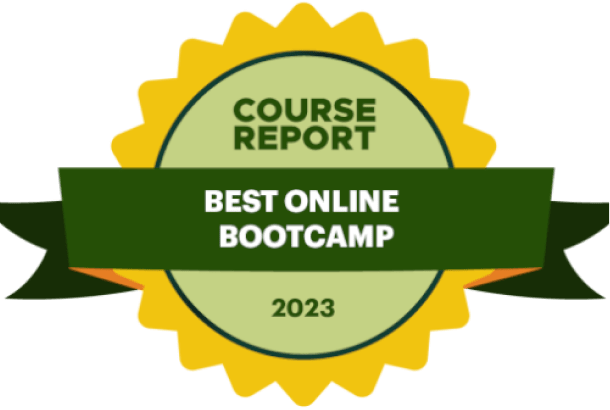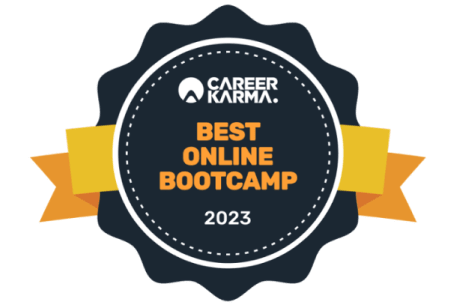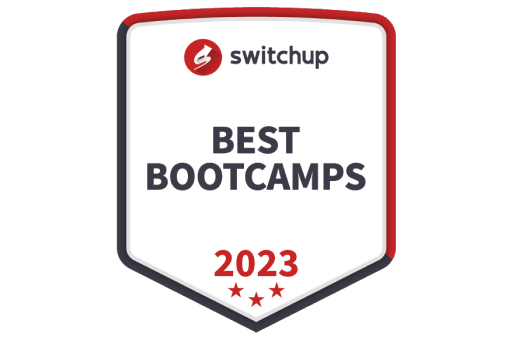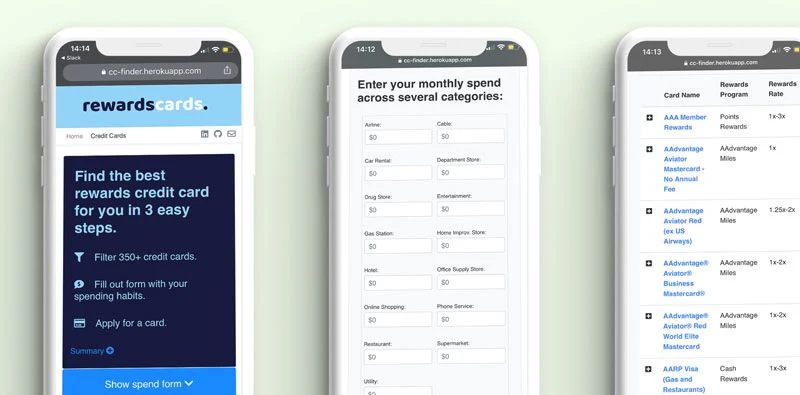Build skills and put them to the test with an online bootcamp designed by software development experts.
Become a software engineer, boost your earnings
+$25K
Average salary increase of software engineers who completed the Springboard bootcamp and provided pre- and post-course salaries
December 2023
In this software engineering bootcamp you will:
Code in the most widely used programming languages in the world
Understand software development theory, tools, and build skills
Test your knowledge through projects that prepare you for a job and boost your work readiness
Plus, you’ll learn the tools and languages developers use, like:






Our software development bootcamp teaches you how to build web-based pages and applications to achieve user, business, and product goals and transform your career in nine months.
Work with a mentor, career coach, and more. They have your back and will hold you accountable.
We back our program with a job guarantee. Get a job or you'll receive a full refund. See terms.

Learn to think like a coding legend
We've partnered with Colt Steele, an industry leader with over 10 years of experience, to develop 800 hours of software engineering content that will push you further, faster.
What you’ll learn in this software engineering bootcamp
Over nine months you’ll learn job-ready full-stack skills. You’ll work through smaller projects and assessments that reinforce your learnings of front-end and back-end development. Plus, you’ll learn to collaborate with generative AI and code smarter, faster with a new AI learning unit.
Topic 1: AI for Engineers: Prompt Engineering
Since the arrival of OpenAI’s GPT-3, there has been an increased awareness of the crucial role prompts play in shaping language model outputs. In this unit of our software engineer bootcamp, you’ll gain an understanding of how language models like GPT-3 and GPT-4 work through interactive exercises, videos, and quizzes.
Learn techniques and best practices for crafting effective prompts to achieve desired outcomes from language models like Chat-GPT
Leverage prompts to assist with the process of efficient coding
NEW! AI for Engineers: Prompt Engineering
Learn to harness the power of AI with this new learning unit, exclusively for Springboard students. Get comfortable speaking the language of ChatGPT and other generative AI language models. Make your code more efficient and build a skill set that puts you ahead of the competition.
Build a portfolio that proves your skills to hiring managers
The best way to learn software engineering is to get hands-on experience coding. Complete 20 mini projects, two cumulative projects and two capstone projects. During this bootcamp, you'll build an interview-ready portfolio you can show to future employers.
While working on the project, you will:
Gain hands-on experience at each stage of the development process, from design and coding to testing and pushing to production - all in a single bootcamp.
Create a database-driven website with an external API and get evaluated at each step — project idea, project proposal, and the complete GitHub repo
Complete one of your capstone projects with Node/Express/React and more robust features
Past projects from Springboard students

Tim Birkmire

Capstone project: Map-based app to help transgender individuals find public restrooms
The Springboard System: Our proven approach to student success
Maybe you’ve tried YouTube or a low-cost web development course. If you have, you know learning on your own can only take you so far. Humans learn best from other humans.
Springboard’s proven human-centric approach means you have a team behind you from day one.
Mastery from your mentor
Build software engineering skills faster with an expert in your corner. Your mentor will keep you accountable and give you an insider's view.
Counsel from your career coach
Get prepared for the job search. Your career coach will help you gain confidence and know-how to land the role.
Support from your student advisor
Stay on track and achieve your goals. Your student advisor has your back and will keep you on track to graduation.
Collaboration from your community
You’ve got a built-in community — students who, just like you, are betting big on themselves.

Mentor: Eddy Sayar
Software Engineer


Mentor: Jessica McElroy
Software Engineer


Mentor: Roy Zheng
Sr. Software Engineer

Here’s why people like you choose Springboard
Springboard coding graduates have achieved life-changing growth. You can too.
+$25,764
Average salary increase of software engineering students who provided pre- and post-course salaries.
December 2023
88.4%
Of job-qualified individuals who reported an offer and received it within 12 months of graduation.
December 2023
2,957
Enrolled students in the Coding bootcamp since 2020.
December 2023

A software development bootcamp with a job guarantee
Invest in yourself with confidence with the Springboard Job Guarantee. If you put in the work and don't land a job, we'll give you a refund. Terms apply.
Eligibility for the Springboard Job Guarantee:
Successful completion of all mandatory coursework, core projects and career development tasks
Fulfill all post-completion job search requirements — regular networking, job applications and interviewing
Is this bootcamp right for you?
Springboard software engineering students come from a variety of professional backgrounds, but they all share a passion for technology.
Requirements
JavaScript fundamentals — ability to write simple functions, loops, and conditional statements and declare variables
Programmatic problem-solving skills — ability to break down a problem into its component pieces, think through it logically, and come up with a solution
Recommended: HTML & CSS fundamentals — ability to build simple web pages with basic knowledge of selectors, common CSS rules and specificity
Don’t meet the requirements? Start with our Foundations to Core program
Become a software engineer from scratch at no extra cost. Build your basic Javascript, HTML, and CSS skills before you take on the core Software Engineering Career Track curriculum.
Apply to the next bootcamp
This software engineering bootcamp is a nine-month program for students devoting 20-25 hours per week.
4 ways to fund your future
Everyone should have the opportunity for growth. That’s why we offer a range of payment options.
What are software developers earning?
These are the average salaries of software engineers in the US.
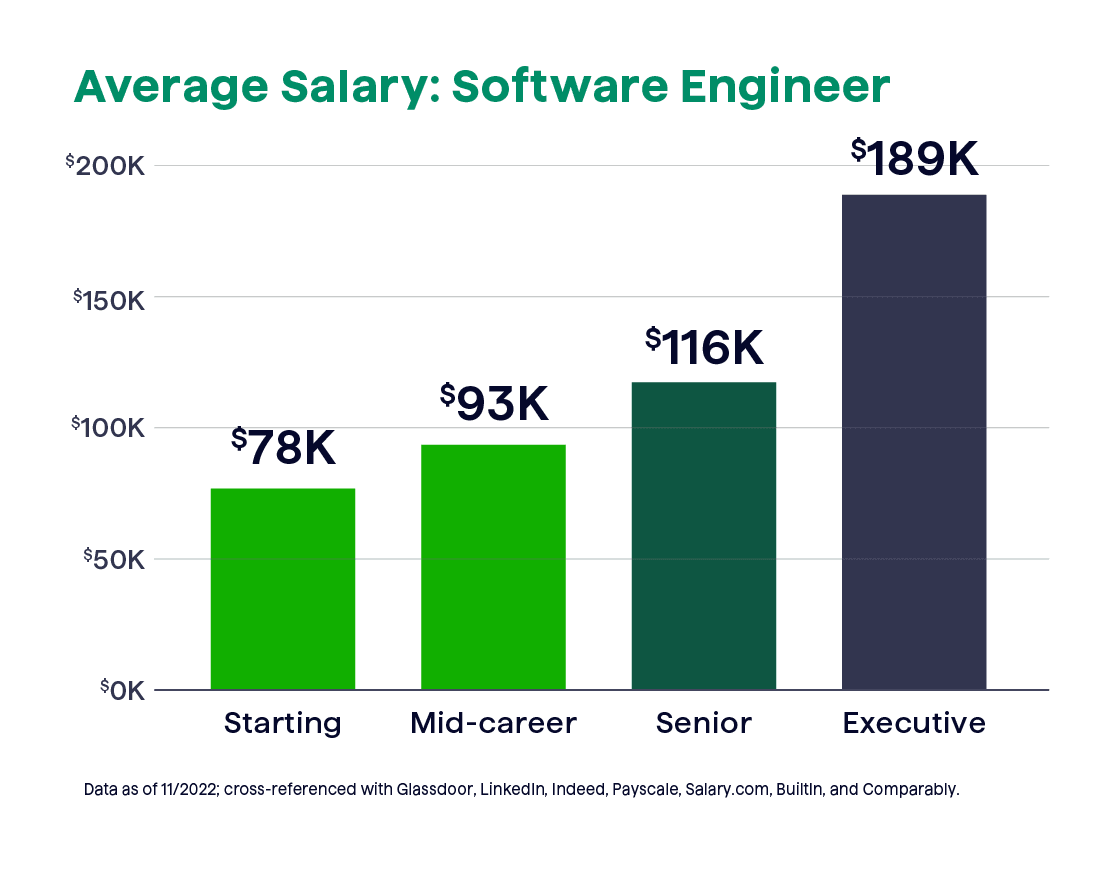
Data as of November 2022; cross-referenced with Glassdoor, LinkedIn, Indeed, Payscale, Salary.com, BuiltIn, and Comparably.

Don't pay until you start your job
With deferred tuition, you’ll hold your spot with a deposit, and then pay just $443/month for 36 months after you get a job. The costs won’t rise.
Other bootcamps structure their tuition payments as Income Share Agreements (ISAs) — that means they take a percentage of your income. You don’t know how much you’ll pay and, if you get a raise, you have to share the upside, which could cost you thousands more.
Better than Income Share Agreements
Other bootcamps structure their tuition payments as Income Share Agreements (ISAs) — that means they take a percentage of your income. With Springboard’s deferred tuition you can save thousands of dollars — it's a smarter alternative to expensive ISAs.
Springboard Deferred Tuition | Bloom Institute of Technology* | Galvanize ISA* | Coding Dojo* | |
|---|---|---|---|---|
Percent of income paid | Fixed | 14% | 10% | 9.8% |
Maximum payment duration | 36 months | 48 months | 48 months | 70 months |
Maximum total cost | $19,480 | $42,950 | $25,172 | $30,963 |
Job guarantee | Yes | Yes | No | No |
Your questions, answered
Ready to become a software engineer? Apply now
Spots are limited, and we accept qualified applicants on a first-come, first-served basis. Start your free application. It takes just 5 minutes to complete.

















